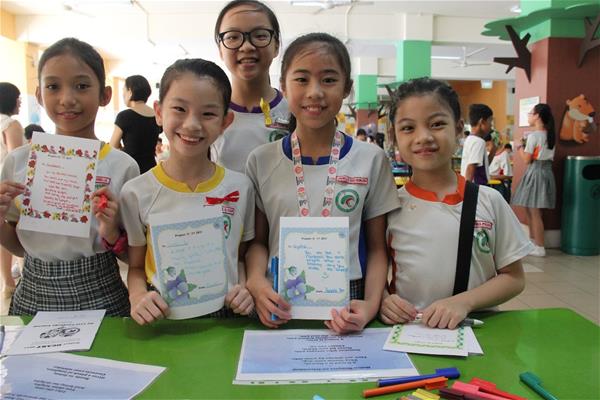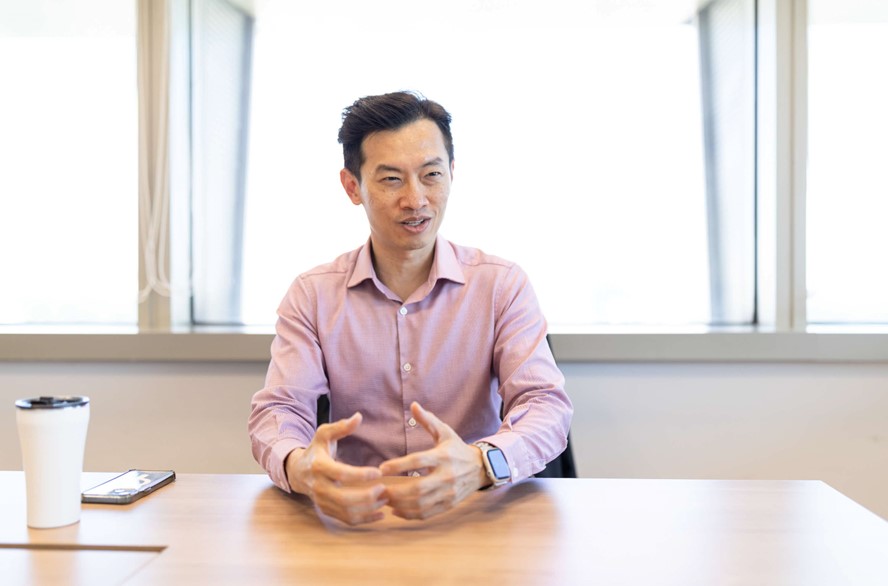Teaching is a great opportunity to impact young lives and change the world a little at a time. Special education teachers face challenges, but at the same time, find great reward in their careers – and nothing beats seeing the difference made in the lives of their students with special educational needs.
Seeing hope in his future
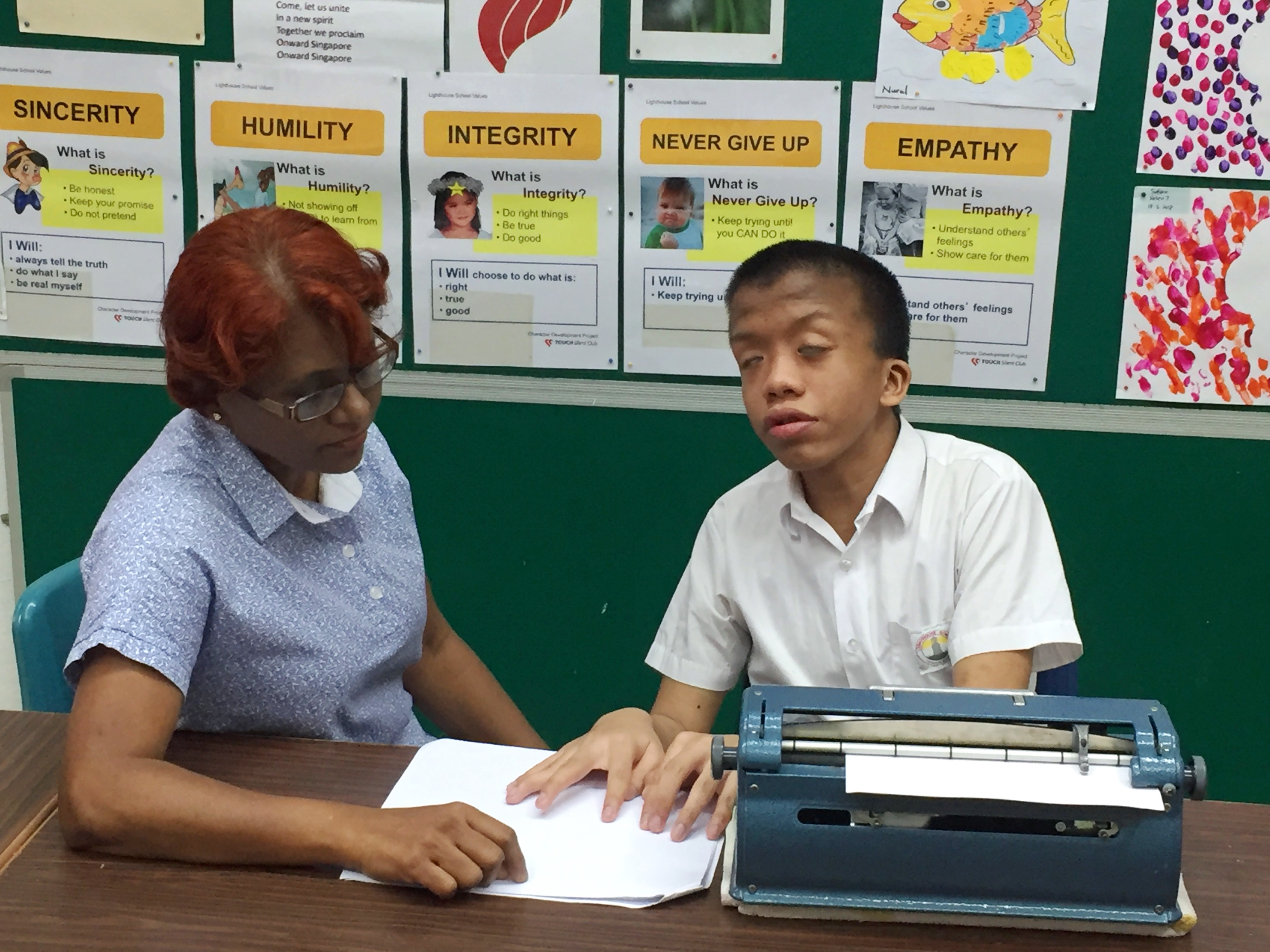
From birth, Sufian Bin Abdullah was visually impaired and he often hid behind his timid personality. He was not keen to attend Lighthouse School, and would often cry. But Ms Suganthy Rose Samuel, Training Planning Coordinator at the school, was not deterred.
Starting with the basics, she taught the 9-year-old boy to cope with day-to-day tasks, such as buttoning his own shirt and putting on his socks and shoes, through a customised Daily Living Skills programme. Her patience and encouragement calmed his fears and Sufian began to gradually relate to her. Through numerous one-on-one lessons, Sufian also learnt to read Braille and is now enthusiastic about learning new things.
It was the belief and persistence of Ms Rose over these seven years that made a lasting impact on Sufian’s life, and it’s not likely that he would ever forget it.
“Thank you Ms Rose for teaching me all these years and for your hard work. Thank you for helping and supporting me. I love you very much!” said Sufian.
Weathering tough times together
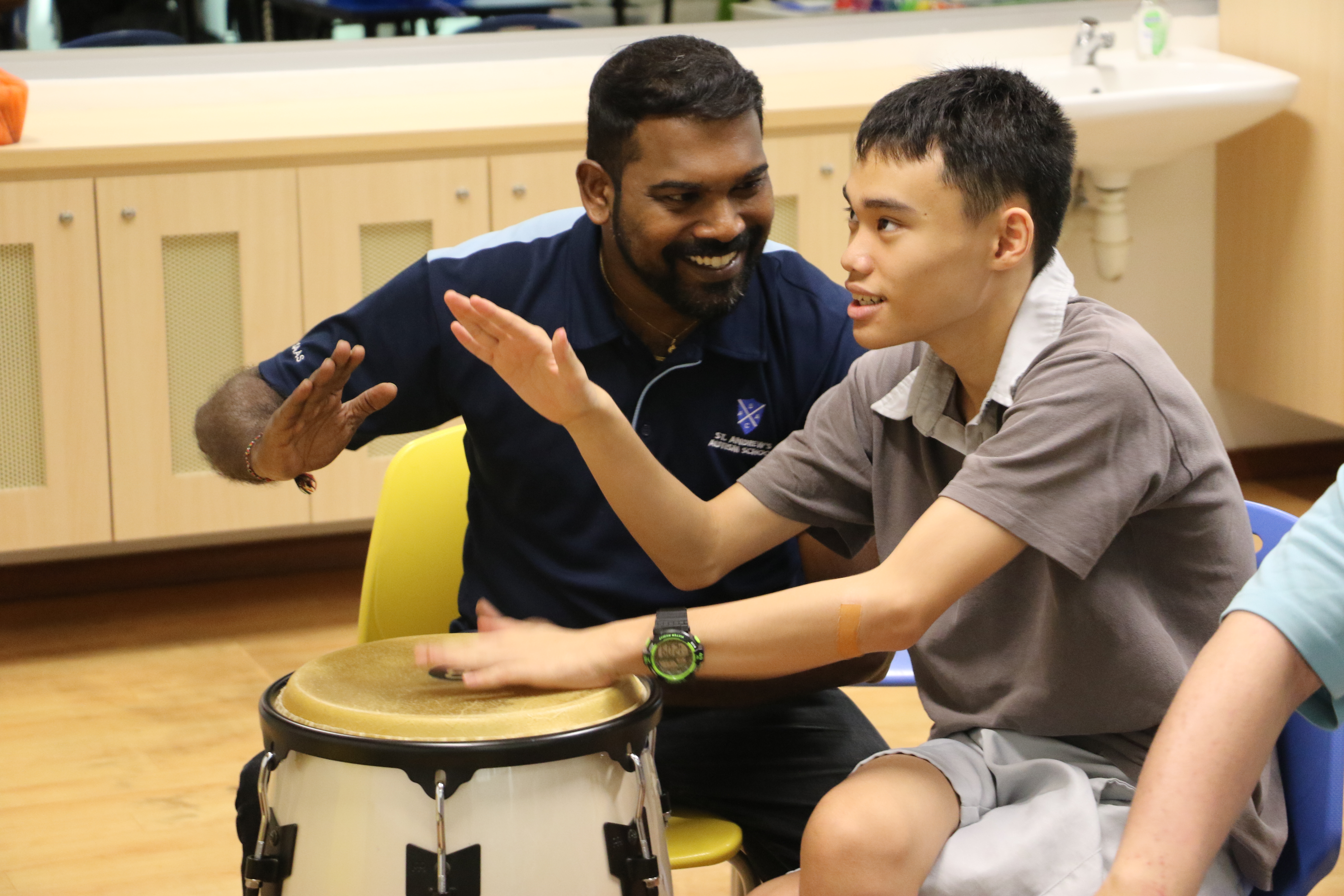
Life isn’t fair, and sometimes, it’s downright tough. Mr N. Saravanan Sam didn’t shy away from challenges, and instead, chose to be there for his students with Autism Spectrum Disorder when they faced life difficulties.
For children with special needs, facing new situations is not easy. Mr Sam understood this, and his work involved preparing them for the transition from school to agencies that train them to be work-ready or provide long-term support. He and his co-teacher even volunteered to accompany his student as he travelled from home to his new vocational school for the first time.
When a student was visibly affected by the passing of a close family member, Mr Sam was there to listen. He knew it was not the time to expect more developmental progress. Instead, he carefully monitored the student’s behaviour and kept in close contact with the family, to ensure that they were aware of how he was coping in school.
But some students’ difficulties were much harder to resolve. When Mr Sam met 17-year-old Lai Jia Ye, he had problems controlling his behaviour due to Autism Spectrum Disorder. He would hit people and destroy property. The aftermath of his meltdown was described as “a tornado that had swept through the classroom”.
Mr Sam tried one-to-one lessons and short breaks to help Jia Ye to focus on learning. When Jia Ye listened and followed instructions that helped him to learn better, he was rewarded with his favourite things, like making a phone call to his mother. Working with his co-teacher, the psychologists and social workers, Mr Sam supported Jia Ye’s family as well, and would share tips with his mother so she could also help him better at home. It was rough time for the special education teachers at St Andrew’s Autism School and the Lai family, but Mr Sam persisted.
“It was a difficult journey. Jia Ye’s positive changes were not possible without the support of the school and teachers,” shared his mother, who was glad to see her son well-adjusted and happy in class and at home.
Serving up vocational skills
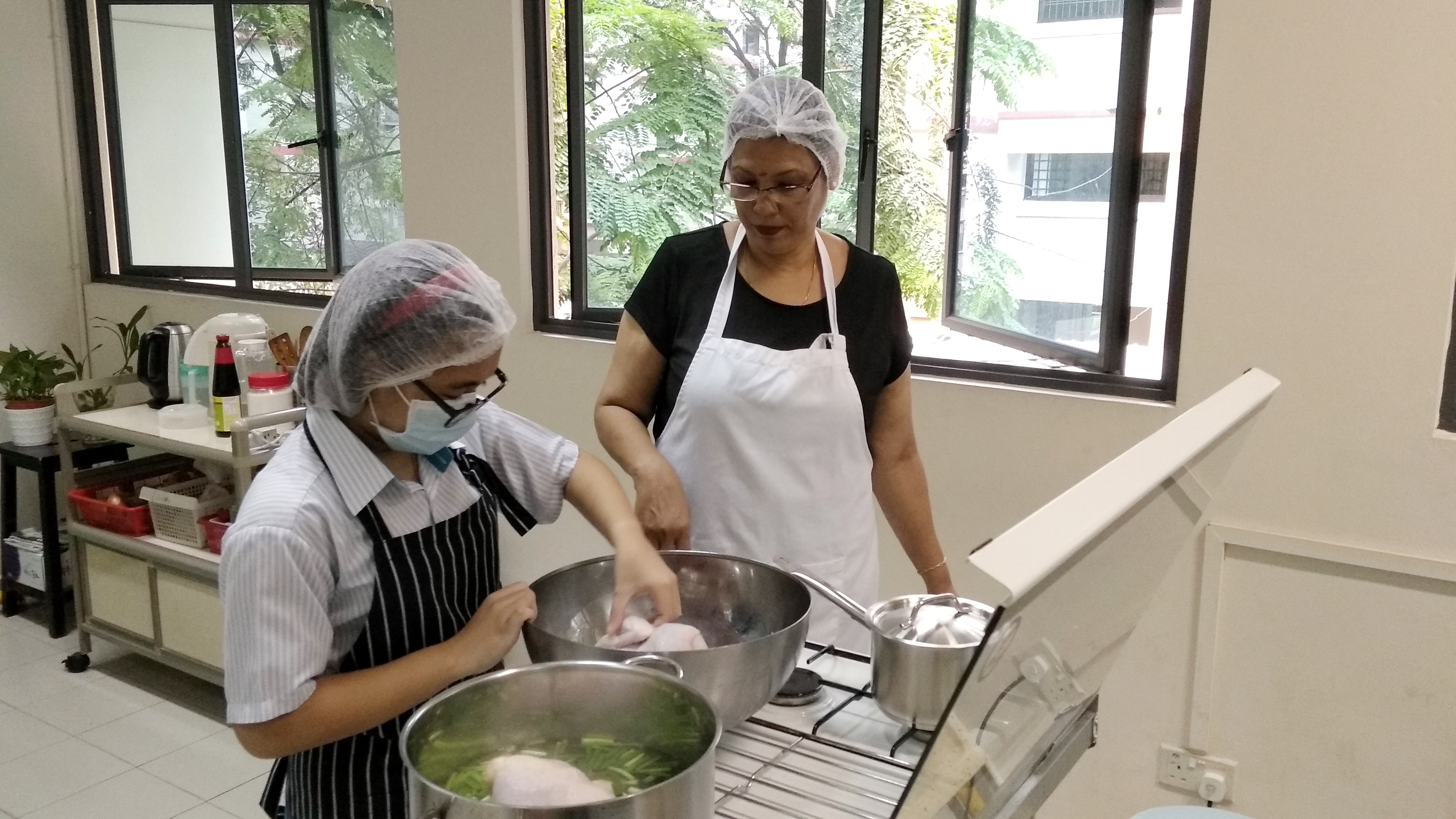
At some special education schools, such as MINDS Woodlands Gardens School, students are taught vocational skills so that they are able to find work when they grow up. Mdm Maniam Vijeyaletchimi, who has 18 years of teaching experience, has been dedicated to teaching Home Economics to students with special needs since 2009. She prepares older students for possible employment through the Extended Vocational Programme, building up their work stamina and training them for external work attachments. She would also train students to take part in inter-school cooking competitions, in the hope of instilling a sense of pride in the work that they do.
Despite being diagnosed with intellectual disability, 19-year-old Shania Kate Monsalve proved that she could still learn and achieve. She successfully obtained a Singapore Workforce Skills Qualification certificate in Food and Beverage Safety & Hygiene Policies & Procedures, thanks to Mdm Vijeya’s committed guidance for the past 9 years.
Nurturing young lives
.jpg)
Believing in the importance of character development and social integration for students with special needs, Mr Andy Ang, a Vocational Educator, chose to emphasise their role in contributing to the community meaningfully.
Through the “Choose Green, Think Green, Grow Green” community project at APSN Tanglin School, Mr Ang taught students to reduce, reuse and recycle. He also challenged them to think beyond themselves, and consider bigger issues such as saving the earth, protecting nature and limiting climate change.
To inspire them and demonstrate to them their potential, Mr Ang helped students to create many miniature gardens around the school, and would bring them for national competitions organised by the National Parks Board. His confidence in their abilities was proven when they received the ‘Community in Bloom’ Silver Award, Gold Award and the Platinum Award in 2016 and 2018.
Planning for practical matters in life
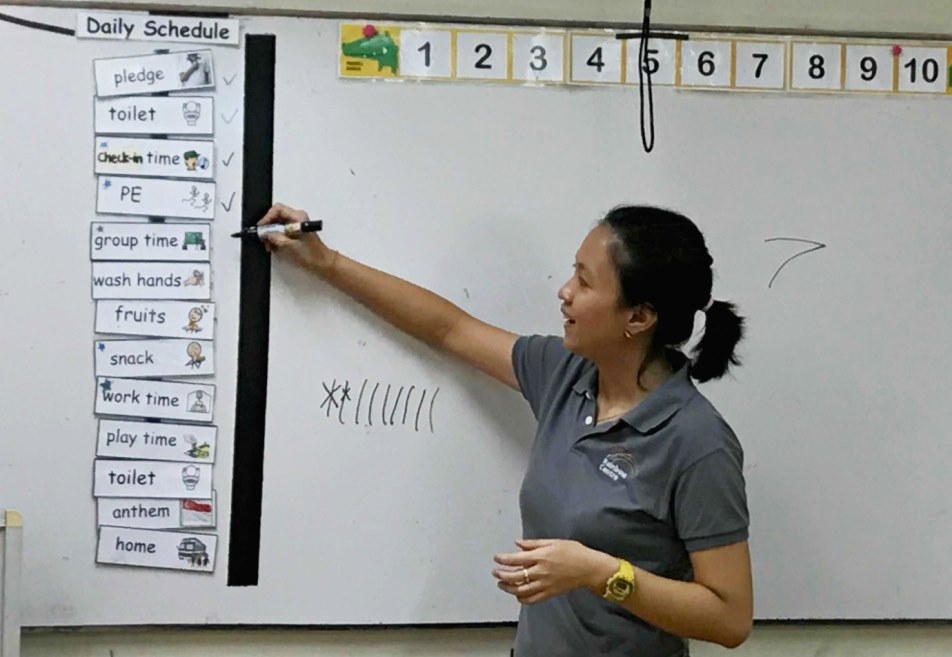
Simple day-to-day activities like buying groceries and paying for food are instinctive to most people, but not to those with more severe special needs. Knowing that her students at Rainbow Centre – Margaret Drive School needed authentic environments to pick up practical skills, Ms Daisy Khng planned for experiential lessons at the supermarket, despite the challenges they might face outside of the school environment. For example, they needed to navigate their wheelchairs through crowds and tight spaces, as well as read fine print. But they coped and also learnt to identify the correct coins, line up at the cashier and share what they had bought with one another.
Ms Daisy also emphasised the importance of basic communication, such as expressing their wants, pointing and making eye contact, which students with severe special needs need to learn for independent living in future. Nur Aliyya Qisya Binte Muhammad Fazrin, 9, had multiple disabilities which limited her speech, so they tried providing her with an Augmentative and Alternative Communication (AAC) app on an iPad. The app would amplify her voice and help her express her thoughts and desires. But she was not interested. Ms Daisy knew she had to guide gently, but firmly. Under her encouragement, Aliyya opened up socially and began interacting with others using the technology.



cab507a7a8a66eb2afccc900c73e6f2e.jpg)
